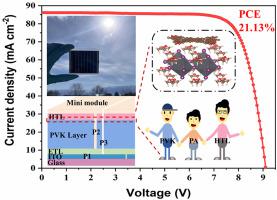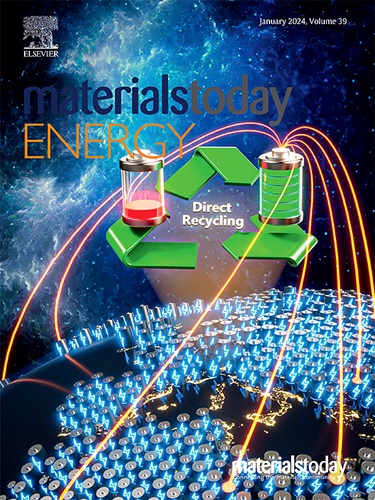用于高效率过氧化物太阳能电池组件的界面增韧技术
IF 8.6
2区 材料科学
Q1 CHEMISTRY, PHYSICAL
引用次数: 0
摘要
包晶体太阳能电池的独特优势,如轻质、高柔性和易变形等,引起了人们的极大兴趣。这些特性使它们非常适合用于便携式电子设备。然而,基于实验室的小型电池与面向工业的大型模块之间仍然存在巨大的效率差距。效率损失的主要原因之一是过氧化物层和空穴传输层之间的脆性界面粘附力有限。在此,我们选择醋酸钾来定制包晶石/空穴传输层的界面。在包晶层和空穴传输层之间存在醋酸钾有可能增强 p 型包晶界面。利用 KPFM 和 DFT 计算可以验证界面接触的加强。因此,电荷分离加快,电压从 1.118 V 大幅提高到 1.139 V,太阳能电池的功率转换效率也得到提高,从 23.76% 提高到 24.81%。此外,过氧化物太阳能模块的损耗很小,在孔径面积为 29.0 厘米的情况下,效率为 21.13%。本文章由计算机程序翻译,如有差异,请以英文原文为准。

Interfacial toughening for high-efficiency perovskite solar modules
The distinctive benefits of perovskite solar cells, such as their lightweight nature, high flexibility, and ease of deformation, have garnered significant interest. These characteristics make them well-suited for use in portable electronic devices. Nevertheless, a large efficiency gap still exists between laboratory-based small cells and industrial-oriented large-scale modules. One of the primary reasons for the efficiency losses is the limited adhesion at the brittle interface between the perovskite layer and hole transport layer. Herein, potassium acetate is selected to tailor the interface of perovskite/hole transport layer. The presence of potassium acetate between the perovskite layer and hole transport layer has the potential to enhance the p-type perovskite interface. The strengthening of the interface contact could be verified by the utilization of KPFM and DFT calculations. As a result, the charge separation is accelerated associated with the substantial enhancement in from 1.118 V to 1.139 V and the power conversion efficiency of the solar cell has been enhanced, resulting in an increase from 23.76% to 24.81%. Additionally, the perovskite solar module exhibits little loss, with an efficiency of 21.13% with an aperture area of 29.0 cm.
求助全文
通过发布文献求助,成功后即可免费获取论文全文。
去求助
来源期刊

Materials Today Energy
Materials Science-Materials Science (miscellaneous)
CiteScore
15.10
自引率
7.50%
发文量
291
审稿时长
15 days
期刊介绍:
Materials Today Energy is a multi-disciplinary, rapid-publication journal focused on all aspects of materials for energy.
Materials Today Energy provides a forum for the discussion of high quality research that is helping define the inclusive, growing field of energy materials.
Part of the Materials Today family, Materials Today Energy offers authors rigorous peer review, rapid decisions, and high visibility. The editors welcome comprehensive articles, short communications and reviews on both theoretical and experimental work in relation to energy harvesting, conversion, storage and distribution, on topics including but not limited to:
-Solar energy conversion
-Hydrogen generation
-Photocatalysis
-Thermoelectric materials and devices
-Materials for nuclear energy applications
-Materials for Energy Storage
-Environment protection
-Sustainable and green materials
 求助内容:
求助内容: 应助结果提醒方式:
应助结果提醒方式:


